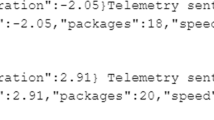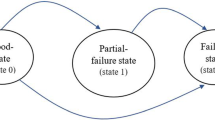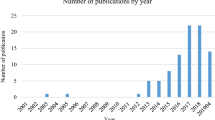Abstract
This study presents a novel discrete-event systems (DES) modeling framework to address real-time system (RTS) with sporadic, periodic, and non-repetitive real-time tasks. Our approach is organized in three steps. First, the effect of individual timing parameters of each task, such as job arrival and deadlines, are represented by modular DES. Second, we choose the required modules for the specific RTS at hand to compose an overall model. Third, we utilize supervisory control to find all schedules that are consistent with the timing requirements of all tasks. In contrast to fixed task priorities, we address general preemption relations represented by a preemption matrix and thereby implement priority-free conditionally-preemptive (PFCP) real-time scheduling. As a particular feature of the closed-loop configuration, the schedules obtained refer to the actual job execution time as opposed to upper and lower bounds. We illustrate our approach by a real-world example in the context of an automated manufacturing system.












Similar content being viewed by others
Notes
The software tool TCT is available at http://www.control.utoronto.ca/DES
libFAUDES incl. luafaudes is available at https://www.rt.tf.fau.de/FGdes
References
Baruah S (2005) The limited-preemption uniprocessor scheduling of sporadic task systems. In: Proceedings of the 17th euromicro conference on real-time systems, pp 137–144
Baruah S, Howell R, Rosier L (1990) Algorithms and complexity concerning the preemptive scheduling of periodic real-time tasks on one processor. Real-Time Syst 2:301–324
Brandin B, Wonham WM (1994) Supervisory control of timed discrete event systems. IEEE Trans Autom Cont 39(2):329–342
Buttazzo GC (2011) Hard real-time computing systems: predictable scheduling algorithms and applications, vol 24. Springer, Berlin
Chen PCY, Wonham WM (2002) Real-time supervisory control of a processor for non-preemptive execution of periodic tasks. Real-Time Syst 23:183–208
Davis RI (2014) A review of fixed priority and EDF scheduling for hard real-time uniprocessor systems. ACM SIGBED Rev 11(1):8–19
Nassor E, Bres G (1991) Hard real-time sporadic task scheduling for fixed priority schedulers. In: Proceedings of the international workshop on responsive systems, pp 44–47
Fei ZN, Reveliotis S, Miremadi S (2015) Åkesson K. A BDD-based approach for designing maximally permissive deadlock avoidance policies for complex resource allocation systems. IEEE Trans Autom Sci Eng 12(3):990–1006
Gu C, Wang X, Li ZW (2019) Synthesis of supervisory control with partial observation on normal state-tree structures. IEEE Trans Autom Sci Eng 16(2):984–997
Gu C, Wang X, Li ZW, Wu NQ (2018) Supervisory control of state-tree structures with partial observation. Inform Sci Elsevier 465(8):523–544
Howell RR, Venkatrao MK (1995) On non-preemptive scheduling of recurring tasks using inserted idle time. Inform Comput J 117(1):50–62
Janarthanan V, Gohari P, Saffar A (2006) Formalizing real-time scheduling using priority-based supervisory control of discrete-event systems. IEEE Trans Autom Cont 51(6):1053–1058
Leung JYT, Whitehead J. (1982) On the complexity of fixed-priority scheduling of periodic real-time tasks. Perform. Eval. (Netherlands) 2(4):237–250
Liu CL, Layland JW (1973) Scheduling algorithms for multiprogramming in a hard-real-time environment. J Assoc Comput Mach 20(1):46–61
Ma C, Wonham WM (2005) Nonblocking supervisory control of state tree structures. vol. 317, LNCIS. Springer-Verlag, Berlin
Ma C, Wonham WM (2006) Nonblocking supervisory control of state tree structures. IEEE Trans Autom Cont 51(5):782–793
Miao L (2018) On controlling prioritized discrete event systems with real-time constraints. Discrete Event Dyn Syst. https://doi.org/10.1007/s10626-018-0269-x
Mohajerani S, Malik R, Fabian M (2014) A framework for compositional synthesis of modular nonblocking supervisors. IEEE Trans Autom Cont 59(1):150–162
Mok AK (1983) Fundamental design problems of distributed systems for the hard-real-time environment. Ph.D. Thesis, Department of Electrical Engineering and Computer Science, Massachusetts Institute of Technology, Cambridge
Moor T, Schmidt K, Perk S (2008) libFAUDES—an open source C++ library for discrete event systems. In: Workshop on Discrete Event Syst. Göteborg
Park SJ, Cho KH (2008) Real-time preemptive scheduling of sporadic tasks based on supervisory control of discrete event systems. Inform Sci 178(17):3393–3401
Ramadge PJ, Wonham WM (1987) Supervisory control of a class of discrete event processes. SIAM J Contr Optim 25(1):206–230
Ramadge PJ, Wonham WM (1989) The control of discrete event systems. Proc IEEE 77(1):81–98
Sha L, Abdelzaher T, Årzén KE, Cervin A, Baker T, Burns A, Buttazzo G, Caccamo M, Lehoczky J, Mok AK (2004) Real time scheduling theory: a historical perspective. Real-Time Syst 28(2):101–155
Waez MTB, Wasowski A, Dingel J, Rudie K (2017) Controller synthesis for dynamic hierarchical real-time plants using timed automata. Discrete Event Dyn Syst 27(2):407–441
Wang X, Khemaissia I, Khalgui M, Li ZW, Mosbahi O, Zhou MC (2015) Dynamic low-power reconfiguration of real-time systems with periodic and probabilistic tasks. IEEE Trans Autom Sci Eng 12(1):258–271
Wang X, Li ZW, Wonham WM (2016) Dynamic multiple-period reconfiguration of real-time scheduling based on timed DES supervisory control. IEEE Trans Ind Inform 12(1):101–111
Wang X, Li ZW, Wonham WM (2017) Optimal priority-free conditionally-preemptive real-time scheduling of periodic tasks based on DES supervisory control. IEEE Trans Syst Man Cybern: Syst 47(7):1082–1098
Wang X, Li ZW, Wonham WM (2018) Priority-free conditionally-preemptive scheduling of modular sporadic real-time systems. Automatica 89:392–397
Wang Y, Saksena M (1999) Scheduling fixed-priority tasks with preemption threshold. In: Proceedings of the real-time computing systems and applications, pp 328–335
Wonham WM, Cai K (2018) Supervisory control of discrete-event systems. Monograph Series Communications and Control Engineering, Springer, 2018, in press
Wonham WM, Ramadge PJ (1988) Modular supervisory control of discrete event systems. Math Cont Signal Syst 1(1):13–30
Acknowledgements
This work was supported in part by the Alexander von Humboldt Foundation, the National Natural Science Foundation of China under Grant No. 61703322, 61673309, and 61603285, and the Science and Technology Development Fund, MSAR, under Grant No. 122/2017/A3.
Author information
Authors and Affiliations
Corresponding author
Additional information
Publisher’s note
Springer Nature remains neutral with regard to jurisdictional claims in published maps and institutional affiliations.
This article belongs to the Topical Collection: Smart Manufacturing -A New DES Frontier
Guest Editors: Rong Su and Bengt Lennartson
Appendix
Appendix
For the running example RTS \(\mathbb {S}\) referring to specification P1, by the standard supcon procedure, we obtain the optimal close-loop behavior represented by 83 states and 116 transitions. The diagram of the calculated supervisor, denoted by SUPER, is given below.
SUPER = (SUPER, [mark, 0, 1, 6, 14, 46, 48, 52], [tran [0,l, 52], [0, γ2, 27], [1, l, 52], [1, γ1, 20], [1, γ2, 39], [2, c2, 4], [3, l, 15], [3, γ2, 33], [4, α1, 37], [4, β2, 13], [5, β1, 44], [7, γ1, 38], [7, β2, 14], [8, β1, 33], [8, ρ1, 9], [9, c1, 11], [10, α2, 44], [11, β1, 10], [11, α2, 5], [12, β2, 35], [13, α1, 40], [14, l, 46], [14, γ1, 36], [15, l, 6], [15, γ2, 10], [16, l, 23], [17, β1, 15], [17, γ2, 11], [18, β1, 3], [18, ρ1, 45], [18, γ2, 8], [19, c1, 18], [19, γ2, 51], [20, α1, 19], [20, γ2, 41], [21, γ1, 22], [21, β2, 48], [21, ρ2, 24], [22, β2, 36], [22, ρ2, 2], [23, l, 48], [24, γ1, 2], [24, c2, 7], [25, γ1, 22], [25, β2, 46], [25, ρ2, 42], [26, c2, 25], [27, α2, 26], [28, β1, 23], [29, β1, 23], [29, ρ1, 30], [30, c1, 47], [31, β2, 23], [31, ρ2, 50], [32, c2, 31], [33, α2, 32], [34, β1, 16], [34, ρ1, 43], [35, c1, 34], [36, α1, 35], [37, β2, 40], [38, α1, 12], [38, β2, 36], [39, γ1, 41], [40, c1, 29], [41, α1, 51], [42, γ1, 2], [43, c1, 28], [44, c2, 21], [45, c1, 17], [45, γ2, 9], [46, γ1, 36], [47, β1, 48], [48, l, 14], [48, γ1, 36], [49, γ1, 38], [49, β2, 48], [50, c2, 49], [51, c1, 8], [52, γ1, 20], [52, γ2, 39], [6, l, 1], [6, γ1, 20], [6, γ2, 39]]) (53, 84)
Rights and permissions
About this article
Cite this article
Wang, X., Li, Z. & Moor, T. SCT-based priority-free conditionally-preemptive scheduling of modular real-time systems with exact task execution time. Discrete Event Dyn Syst 29, 501–520 (2019). https://doi.org/10.1007/s10626-019-00288-8
Received:
Accepted:
Published:
Issue Date:
DOI: https://doi.org/10.1007/s10626-019-00288-8




